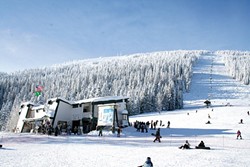Wednesday, March 29, 2017
Court of Appeals rules in favor of Mt. Spokane ski area expansion

The ski area expansion at Mt. Spokane is another step closer to reality after a court decision Tuesday.
It was okay for Washington state to designate a portion of Mount Spokane for recreation, which will allow for a new ski lift and runs, according to a 2-1 Court of Appeals decision posted on Tuesday.
In 2014, the state Parks and Recreation Commission found that part of an 800-acre site on the northwest side of the mountain could be used for recreation, a portion could be used for things like backcountry skiing, hiking and other activities already taking place, and protected a portion as natural forest area. New ski runs would go on a portion of the 279 recreation acres.
In Tuesday's decision, two Washington State Court of Appeals Division II judges found, as did a superior court judge, that the Commission did not act arbitrarily or capriciously in classifying that portion of the mountain as recreation land.
Those appealing the Commission's decision, including the Lands Council and environmental groups, with support from the Spokane Tribe, argued that the classification went against the Commission's own policies, "ignored the evidence of the area's natural resource value," and ignored the cultural resources guidance of its policies, but the court disagrees, according to the decision.
Decades of study
Studies of whether roughly 800 acres could be used to expand the ski area have been going on for more than 20 years.
That chunk of land, known as the Potential Alpine Ski Expansion Area (PASEA), was noted as a possible expansion site when the nonprofit that runs the Mt. Spokane Ski and Snowboard Park agreed to run the park in 1997. The area was studied back in 1992, according to an environmental study prepared for the Commission's decision.
After the ski area had the worst season on record in 2004-2005, with only 29 operational days, the nonprofit started to push forward on expanding into the northwest, where the sun is less likely to degrade the ski runs, says Brad McQuarrie, general manager for the ski and snowboard park.
"It really impressed upon me the need to have more north-facing terrain," McQuarrie says.
The original ski resort was located on that side of the mountain, near the PASEA, in the 1930s through the 1950s, when the lodge burned down.
"That is some of the best terrain on the mountain here, and has less solar decay," McQuarrie says.
From 2006 on, the nonprofit took on studies of the area, and the Commission accepted public comment and went through the environmental impact study process.
Environmental groups and the Spokane Tribe say that the natural resources and wildlife in that area should be protected, and that the area is historically significant to the tribe, which used it for hunting, gathering, and spiritual purposes.
The expansion was about ready to move forward in early 2016, with all permits in hand, when the ski park was contacted by the state's Department of Archaeology and Historic Preservation, which let them know they'd need another permit from that department, since the tribe had listed the area as a traditional cultural property, McQuarrie says.
They hired the tribe's recommended consultant to do another survey of the site, and got that last permit in early March this year, he says.
The state has required the nonprofit have all permits needed before starting work, which has been difficult, McQuarrie says, but he also understands why it would be necessary.
"I could see their point. Let's say I remove the timber, and for some reason couldn't build the chairlift because of a wetland issue," he says.
Dissent and next steps
The dissenting judge in the decision posted Tuesday agreed with the tribe and environmental groups that the Commission should not have classified that area for recreation.
The dissent leans on a Commission policy that states, "[w]here significant natural and cultural resources exist at a site or within a landscape, agency staff must protect the integrity of all significant resources."
"The Commission and the majority take the position that this requirement is met by protecting some of the resources in the PASEA and sacrificing others," the dissent says. "This position, though, founders on (the policy's) plain command to protect the integrity of all significant resources in these circumstances."
Work could start to move forward on the expansion, although if the groups appeal the recent decision, they could also try to get an injunction to keep things from moving forward.
The Inlander left a message with the Lands Council Wednesday, and may update this post with more information.
Tags: Mt. Spokane , ski expansion , Mount Spokane , Washington state , tribe , environmental , News , Image





















